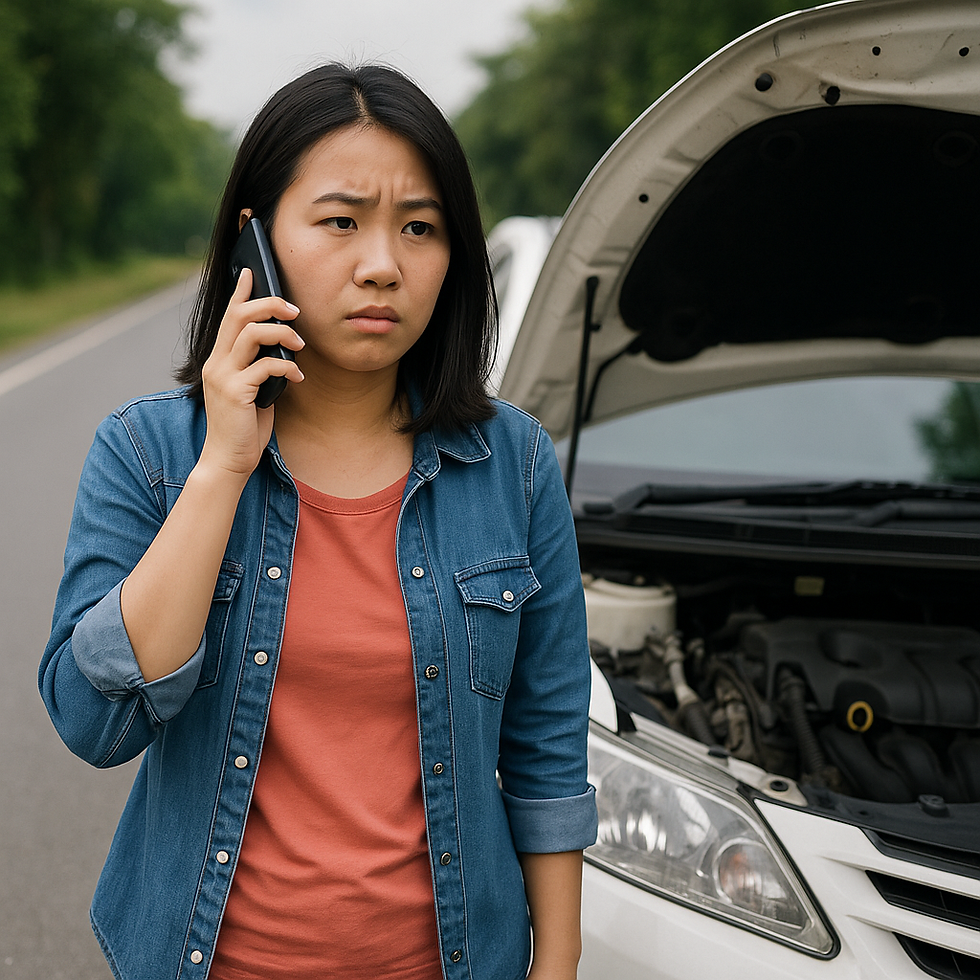Be Prepared for Roadside Emergencies
- Kristen, Head Honey Badger

- Jun 9, 2025
- 3 min read
Updated: Aug 11, 2025

Your Essential Guide
We've all felt it—the uncomfortable knot of anxiety when something unexpected happens far from home. Perhaps it's late at night, and you're leaving work exhausted, only to find that your car won't start. Or maybe you're on a family trip when your tire suddenly goes flat, leaving you stranded with restless kids and mounting stress. Emergencies strike unexpectedly, and when they do, the vulnerability can feel overwhelming.
Take Back Control by Preparing in Advance
Roadside emergencies are stressful, but preparation can turn panic into empowerment. Regularly check your vehicle's essential components. This includes the oil, battery, tires, brakes, and lights. Keep your phone charged, and always inform someone of your travel plans, especially on long trips.
Practicing basic maintenance routines can prevent many common roadside issues. Familiarize yourself with tasks like changing a tire, checking oil levels, and jump-starting your battery. Being proactive ensures you’re ready to handle unexpected situations calmly and efficiently.
Essential Items for Your Car Emergency Kit:
First Aid Kit: Bandages, antiseptics, pain relievers, and any necessary medications.
Emergency Food and Water Non-perishable snacks like energy bars, granola bars, or nuts, and water pouches.
Flashlight: with extra batteries or a hand-crank version. If the flashlight is chargeable, check it when the seasons change and several times during a cold winter.
Blanket: To keep warm if stranded, especially during colder weather.
Jumper Cables: Essential for dealing with a dead battery.
Spare tire: Make sure it fits your wheel and is filled with air!
Tire Pump: Know how to check your tire pressure and understand when the low tire pressure light comes on. (Pro tip: if you are constantly losing air in your tires, it’s time to check for a leak or see if you need new tires.)
Reflective Safety Triangles or Flares: To alert others of your presence if you're stopped on the road.
Multi-tool Basic tools such as screwdrivers, pliers, and an adjustable wrench.
Duct Tape: Useful for temporary fixes.
Work Gloves: To protect your hands during repairs or tire changes.
Phone Charger: Ensure your phone stays powered in emergencies (several of our flashlights have this option).
Budget-Conscious Safety Solutions
Preparedness doesn't need to be expensive. Simple actions like keeping spare supplies, maintaining regular vehicle check-ups, and knowing emergency contact numbers can significantly reduce stress during roadside incidents.
The Importance of Regular Maintenance
Regular vehicle maintenance is crucial. Schedule routine check-ups to ensure your car is in good condition. This can prevent unexpected breakdowns and keep you safe on the road.
Understanding Your Vehicle
Take time to understand your vehicle's features. Read the owner's manual to familiarize yourself with essential functions. Knowing how to operate your car can save you time and stress during emergencies.
Emergency Contacts
Create a list of emergency contacts. This should include family members, friends, and roadside assistance numbers. Keep this list in your glove compartment or on your phone for easy access.
Stay Calm, Stay Ready
Consistently taking these small but crucial steps can significantly impact how you navigate roadside emergencies. With thoughtful preparation, you reclaim control, boost your confidence, and maintain peace of mind on every journey.
For those seeking additional convenience and confidence, Honey Badger Preps offers a variety of ready-made car emergency kits tailored to your needs. Our kits simplify preparation, helping you stay secure on every drive.
In conclusion, being prepared for roadside emergencies is essential. By taking proactive steps, you can ensure your safety and the safety of your passengers. Remember, be prepared, not afraid.





Comments